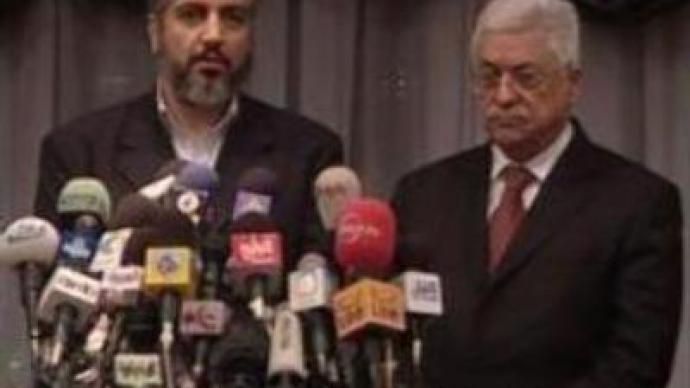Hamas and Fatah again try to form unity government

Palestinian president Mahmoud Abbas, and the exiled Hamas leader, Khaled Mashaal, are meeting in Mecca, Saudi Arabia, in an effort to end in-fighting and to form a unity government in Palestine.
Demonstrating the significance that this meeting has for both sides of the dispute, the delegations from Fatah and Hamas in Mecca are comprised of high-ranking officials: the Fatah delegation is headed by the Palestinian President, Mahmoud Abbas, and also numbers in its ranks Mohammed Dahlan, who is the leader of Fatah in Gaza, whereas the Hamas delegation is headed by Khaled Meshaal, who is the chief of Hamas' political bureau based in Damascus, Syria; the Palestinian Prime Minister, Ismail Haniya, is present in the Hamas delegation, as well as Hamas' Foreign Minister Mahmoud Al-Zahar.The leaders seem to share the quite optimistic tenor of the Palestinian Prime-Minister, Ismail Haniya. They also seem to believe the latest round of talks in Mecca will yield concrete results that will lead to the formation of a government of national unity in Palestine.In addition, the mediators between Hamas and Fatah said that the differences between both sides of the dispute have narrowed recently after preliminary talks in the framework of preparing to this meeting. On the other hand, voices of criticism could be heard from some officials in Israel, saying that even if a concrete productive solution could be reached, it would be very difficult for the Palestinian leaders to enforce their deal on the ground, as the world witnesses the worst fighting between Hamas and Fatah in recent weeks.Moreover, Hamas said that if no unity government deal is struck in Mecca, it will call for early elections.So, unfortunately, the agreement that could be made in Mecca does not seem to necessarily mean that the fighting on the ground will be abated. Some analysts believe that the Palestine crisis is aggravated by the dispute over the control of financial flows.
Thus, Evgeny Satanovsky, a leading analyst from the Institute of Middle East Studies in Moscow, said:
“Now Palestine is not a state, it's a failing state or a territory like Chechnya in Russia, Kosovo etc, not long ago. The only thing that the Palestinian leaders are interested in, is a few billion dollars a year, which they distribute between themselves and their supporters. There is no question about the future of Palestine, no question of the real government which will develop this territory with the idea of a long-term strategy, with the idea of what to do with the children of Palestine. The only question is who will keep the money and from whom this money will be distributed. That’s it. Hamas wants their piece of the pie, and Fatah wants it too. It was time when they wanted to be the only ones. Both – it was impossible. Now, this is a new stage.”Meanwhile, there have been some signs emerging during the present talks that Hamas Prime Minister, Ismail Haniya, will stay on as head of the unity government, whereas Mahmoud Al-Zahar will be replaced by an independent candidate.
You can share this story on social media:












